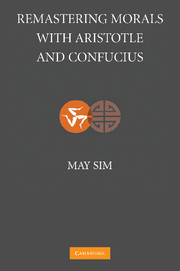Book contents
- Frontmatter
- Contents
- Acknowledgments
- Abbreviations
- Introduction
- 1 Aristotle in the Reconstruction of Confucian Ethics
- 2 Categories and Commensurability in Confucius and Aristotle: A Response to MacIntyre
- 3 Ritual and Realism in Early Chinese Science
- 4 Harmony and the Mean in the Nicomachean Ethics and the Zhongyong
- 5 The Moral Self in Confucius and Aristotle
- 6 Virtue-Oriented Politics: Confucius and Aristotle
- 7 Making Friends with Confucius and Aristotle
- Glossary of Chinese Terms
- Name Index
- Subject Index
4 - Harmony and the Mean in the Nicomachean Ethics and the Zhongyong
Published online by Cambridge University Press: 18 July 2009
- Frontmatter
- Contents
- Acknowledgments
- Abbreviations
- Introduction
- 1 Aristotle in the Reconstruction of Confucian Ethics
- 2 Categories and Commensurability in Confucius and Aristotle: A Response to MacIntyre
- 3 Ritual and Realism in Early Chinese Science
- 4 Harmony and the Mean in the Nicomachean Ethics and the Zhongyong
- 5 The Moral Self in Confucius and Aristotle
- 6 Virtue-Oriented Politics: Confucius and Aristotle
- 7 Making Friends with Confucius and Aristotle
- Glossary of Chinese Terms
- Name Index
- Subject Index
Summary
Aristotelians and Confucians stress virtue and the necessity of training to cultivate virtue. Aristotelians describe virtue as a disposition to achieve a mean between extremes, a middle path between an excess and a defect in the possibilities of action and emotion. Something like this idea is evident in Confucian traditions. Confucians, however, emphasize the idea of harmony. Aristotelians have something like the idea of harmony in virtue's effects on one's internal and external relations, but it remains underemphasized. My aim in this chapter is to show that the Aristotelian mean and Confucian harmony (and the principle of that harmony, the zhong or crux) are not only comparable but complementary.
What Confucian term – if any – corresponds to Aristotle's “mean” (meson)? The most natural correlate might seem to be “zhong.” Legge's time-honored 1893 translation of the Zhongyong renders it The Doctrine of the Mean. And it does seem as if a mean or middle is the target of actions and desires in the Zhongyong. Wing-Tsit Chan explains the term “Zhongyong” by saying that it “literally” means “ ‘centrality and universality’, [and] has been translated as moderation, the mean, mean-in-action, normality, universal moral order, etc.” Chan continues: “According to Cheng Hsuan (127–200, Confucian Commentator), yong means the ordinary and Zhongyong means using the mean as the ordinary way. According to Zhu Xi (1130–1200, Confucian commentator), it means neither one-sided nor extreme but the ordinary principle of the mean” (Chan Wing-tsit, A Sourcebook in Chinese Philosophy, 98–99, my parentheses).
- Type
- Chapter
- Information
- Remastering Morals with Aristotle and Confucius , pp. 100 - 133Publisher: Cambridge University PressPrint publication year: 2007
- 1
- Cited by



